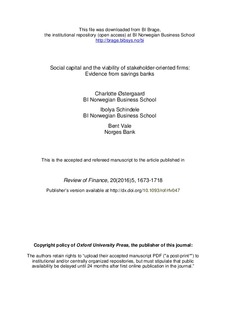| dc.contributor.author | Østergaard, Charlotte | |
| dc.contributor.author | Schindele, Ibolya | |
| dc.contributor.author | Vale, Bent | |
| dc.date.accessioned | 2016-11-21T13:38:43Z | |
| dc.date.available | 2016-11-21T13:38:43Z | |
| dc.date.issued | 2016 | |
| dc.identifier.citation | Review of Finance, 20(2016)5, 1673-1718 | nb_NO |
| dc.identifier.issn | 1572-3097 | |
| dc.identifier.issn | 1875-824x | |
| dc.identifier.uri | http://hdl.handle.net/11250/2422185 | |
| dc.description | This is the accepted and refereed manuscript to the article | nb_NO |
| dc.description.abstract | We show that social capital improves the viability of stakeholder-oriented rms
operating in competitive markets. Studying exits from the population of Norwegian
savings banks after deregulations, we nd that banks located in communities with
high social capital have a higher probability of survival, but no similar e ect exists
for commercial banks. Norwegian savings banks are collectively governed by their
stakeholders and we provide evidence that social capital improves the e ciency of
stakeholder governance. In high social capital areas, banks raise more deposits locally,
distribute more of their surplus for altruistic purposes, and operate more locally-focused
branch networks. | nb_NO |
| dc.language.iso | eng | nb_NO |
| dc.publisher | Oxford University Press | nb_NO |
| dc.title | Social capital and the viability of stakeholder-oriented firms: Evidence from savings banks | nb_NO |
| dc.type | Journal article | nb_NO |
| dc.type | Peer reviewed | nb_NO |
| dc.source.journal | Review of Finance | nb_NO |
| dc.identifier.doi | http://dx.doi.org/10.1093/rof/rfv047 | |
| dc.description.localcode | 2, Forfatterversjon | nb_NO |
